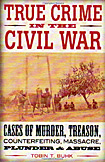
by Susan Branch--
Sherman is famously quoted as saying "War is Hell," but he didn't bother to add that desperate, unscrupulous men and women involved in war will commit any crime, no matter how vile. True Crime in the Civil War by Tobin T. Buhk is a rare novelty in the profusion of writing about the Civil War, a volume that takes a different approach, by examining some of the crimes, punished or not, famous and obscure, even violent or nonviolent, that took place during this dark period of our history.
Some of Buhk's chapters will be more or less familiar to those with a passing acquaintance with Civil War history. Most of us know that those accused of participating in the assassination of Abraham Lincoln were tried and, in several cases, executed, although we may not remember the details of the trial that Buhk describes. We may also have heard of the dreaded Confederate prison for captured Union soldiers at Andersonville, Georgia, and know that the commander of that prison was also tried and convicted. We may even have read of the marauding Missourians who attacked Lawrence, Kansas with much loss of life and property, under the leadership of William Quantrill. Both Frank and Jesse James rode with Quantrill.
But other chapters tell of cases that are little known, except, perhaps, to specialists. (There may be individual scholarly books on some of these crimes, but not a collection like this that is almost compulsively readable even for the layman.) For instance, there is the murder of members of the Beckham family by Black "Contrabands," escaped slaves theoretically under Union control. There is the arson attempt that had a number of Confederate spies trying to burn down the city of New York by simultaneously setting fires in their hotel rooms. And there is the puzzling case of Temperance Neely, the woman who shot a former slave of her mother's. Was it murder, as prosecutors alleged, or accident? And would the case hang on the admissibility of testimony by former slaves?
Also fascinating are two cases of generals (one on each side) being killed not by the enemy, but by one of their fellow officers. How did that happen? In one case, an officer felt that he, and others from his State, were disrespected by his commanding officer. For a variety of reasons, the unfortunately named Indianan Jefferson C. Davis was never punished for the shooting of William "Bull" Davis. The other case was a dispute over whether John Marmaduke had implied that "Marsh" Walker behaved in a cowardly manner. To decide the issue, the men fought an illegal duel, the last on record in Arkansas, and only one walked away.
Of interest to many will be the chapter on counterfeiting during the Civil War. Printers in the North made copies of Confederate notes as curios, initially, only to have them purchased by entrepreneurs who smuggled them into the South and used them to buy goods inexpensively. This "free enterprise" eventually destroyed the economy of the South. Federal authorities looked the other way, until the printers explored printing replicas of US currency.
Buhk is not a professional historian, though he obviously has researched the book thoroughly. He especially is to be commended for pointing out that atrocities were committed by both sides, though only the perpetrators on the losing side were punished.

Title - True Crime in the Civil War: Cases of Murder, Treason, Counterfeiting, Massacre, Plunder & Abuse
Author: Tobin T. Buhk
Publisher: Stackpole Books (Feb. 16, 2012), 320 pp.
$14.93 (paperback) at amazon.com
ISBN-10: 081171019X
ISBN-13: 978-0811710190
For info about Buhk's other titles go here.






Comments